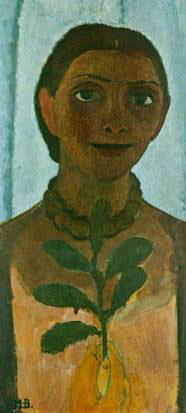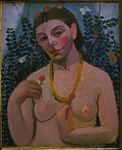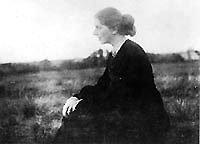RAINER MARIA RILKE



In 1900, Rainer Rilke met Paula Becker in the rural artist colony of
and immediately fell in love with her strength of personality and artistic talent. They were both 24 years old. Though Paula was also drawn to Rilke, she was already betrothed to German painter Otto Modersohn. They were engaged just weeks after she met Rilke who, upon discovering their relationship, rebounded to Paula's best friend, sculptress Clara Westhoff. The two artist couples -- self-named "The Family" for the strong artistic bonds they formed -- both married in the Spring of 1901.
The following December, the Rilkes gave birth to a daughter, Ruth Rilke. The Modersohns, however, remained childless until late 1907. Rainer Maria Rilke found his new life as a father and family man harshly incompatible with his artistic needs. Six months after Ruth was born, he and Clara agreed to live apart. Clara's parents also agreed to take care of Ruth so the two of them could pursue their art. Their little family experienced brief reunions throughout their lives but never remained together.
http://www.paratheatrical.com/pages/videofilms/gc-rilkepaula.html
Rainer Maria Rilke (1875-1926) wrote "Requiem For a Friend" as a tribute to his good friend, the painter Paula Modersohn-Becker (1876-1907), who suddenly died eighteen days after giving birth to her first child. Rilke wrote it over two haunted nights (October 31 and November 1st, 1908) at his room in the Hotel Biron, Paris, almost a full year after hearing the news of Paula's parting. "Requiem For a Friend" was first published in 1909. This page is posted as part of the Vertical Pool production of "The Greater Circulation", a feature film by Antero Alli incorporating Stephen Mitchell's translation of Rilke's "Requiem" in its entirety.
Ultima strofa del poema
da: http://lapoesiaelospirito.wordpress.com/2008/08/15/rainer-maria-rilke-requiem-per-unamica/
………………………………
Ci sei ancora? In che angolo sei?
Hai saputo così tanto di tutto ciò
e così tanto hai potuto, allorché te ne andasti
aperta a tutto come un giorno che spunta.
Le donne soffrono: amare significa esser soli,
e gli artisti intuiscono talvolta nel lavoro
che devono trasformare quando amano.
Cominciasti entrambi; entrambi sono in ciò
che una gloria ora ti toglie sfigurandolo.
Ah, eri lungi da ogni gloria. Eri
inappariscente; avevi sommessamente raccolto in te
la tua bellezza come si tira dentro
una bandiera al grigio mattino di un giorno feriale,
e volevi null’altro che un lungo lavoro -
che non è compiuto, tuttavia non compiuto.
Se ci sei ancora, se in questo buio
c’è ancora un posto dove il tuo spirito
delicato vibri alle piatte ombre sonore
che una voce, solitaria nella notte,
suscita nella corrente di un’alta stanza -
allora ascoltami: aiutami. Vedi, noi scivoliamo così,
senza sapere quando, dal nostro progresso giù
in qualcosa che non supponiamo; lì dentro
c’impigliamo come in sogno
e lì dentro moriamo senza destarci.
Nessuno è più avanti. A chiunque ha sollevato
il proprio sangue in un’opera che diviene lunga
può capitare di non più tenerlo alto
e ch’esso segua il peso suo, senza valore.
Da qualche parte infatti c’è un’antica ostilità
tra la vita e il gran lavoro.
A che la riconosca e dica: aiutami.
Non tornare. Se lo sopporti, sii
morta tra i morti. I morti hanno molto da fare.
Ma aiutami lo stesso senza dover distrarti,
come mi aiuta a volte quello ch’è più lontano: in me.
…
Bist du noch da? In welcher Ecke bist du? –
Du hast so viel gewußt von alledem
und hast so viel gekonnt, da du so hingingst
für alles offen, wie ein Tag, der anbricht.
Die Frauen
und Künstler ahnen manchmal in der Arbeit,
daß sie verwandeln müssen, wo sie lieben.
Beides begannst du; beides ist in Dem,
was jetzt ein Ruhm entstellt, der es dir fortnimmt.
Ach du warst weit von jedem Ruhm. Du warst
unscheinbar; hattest leise deine Schönheit
hineingenommen, wie man eine Fahne
einzieht am grauen Morgen eines Werktags,
und wolltest nichts, als eine lange Arbeit, -
die nicht getan ist: dennoch nicht getan.
Wenn du noch da bist, wenn in diesem Dunkel
noch eine Stelle ist, an der dein Geist
empfindlich mitschwingt auf den flachen Schallwelln,
die eine Stimme, einsam in der Nacht,
aufregt in eines hohen Zimmers Strömung:
So hör mich: Hilf mir. Sieh, wir gleiten so,
nicht wissend wann, zurück aus unserm Fortschritt
in irgendwas, was wir nicht meinen; drin
wir uns verfangen wie in einem Traum
und drin wir sterben, ohne zu erwachen.
Keiner ist weiter. Jedem, der sein Blut
hinaufhob in ein Werk, das lange wird,
kann es geschehen, daß ers nicht mehr hochhält
und daß es geht nach seiner Schwere, wertlos.
Denn irgendwo ist eine alte Feindschaft
zwischen dem Leben und der großen Arbeit.
Daß ich sie einseh und sie sage: hilf mir.
Komm nicht zurück. Wenn du´s erträgst, so sei
tot bei den Toten. Tote sind beschäftigt.
Doch hilf mir so, daß es dich nicht zerstreut,
wie mir das Fernste manchmal hilft: in mir.
da: http://www.editions-verdier.fr/v3/oeuvre-requiem.html
………………………………
Es-tu encore là ? Dans quel recoin es-tu ? –
De tout cela tu as eu une si ample science,
tu as pu accomplir tant de choses en t’éloignant ainsi,
ouverte à tout, comme un jour qui commence.
Les femmes souffrent : aimer veut dire être seul,
et les artistes parfois dans leur travail pressentent
que leur devoir, quand ils aiment, est la métamorphose.
Amour, métamorphose : tu entrepris l’un et l’autre ; il y a l’un
et l’autre dans Cela qu’à présent falsifie une gloire qui te les dérobe.
Hélas, toi qui fus loin de toute gloire. Toi qui fus
de peu d’apparence ; qui avais sans bruit replié
ta beauté en toi-même, comme on baisse un drapeau
au matin gris d’un jour ouvrable,
et ne voulais rien d’autre qu’un long travail, –
travail qui n’est pas accompli : non, hélas, pas accompli.
Si tu es encore là, s’il reste encore
dans cette obscurité une place à laquelle ton esprit
vibre sensiblement, à l’unisson des ondes planes et sonores
qu’une voix, solitaire dans la nuit,
suscite dans le flux d’une haute chambre :
Alors, écoute-moi : Aide-moi. Vois, nous allons nous aussi
glisser, nous ne savons quand, revenir de notre avancée vers
quelque chose que nous n’imaginons pas, où
nous serons empêtrés comme dans un rêve,
et dans quoi nous mourrons sans nous réveiller.
Nul n’est plus avancé. À tous ceux qui ont soulevé leur sang
pour une œuvre qui s’avère longue,
il peut arriver de ne plus le tenir à bout de bras
et qu’il retombe, privé de valeur et vaincu par son poids.
Car il existe quelque part une antique hostilité
entre la vie et le noble travail.
Afin que je la discerne et la dise : aide-moi.
Ne reviens pas. Et donc – si tu le supportes–
sois morte chez les morts. Les morts ont
Aide-moi pourtant, sans dissiper tes forces,
comme m’aide parfois le plus lointain : en moi.
da: http://www.paratheatrical.com/requiemtext.html
………………………………
Are you still here ? Are you standing in some corner ? You knew so much of all this, you were able to do so much; you passed through life so open to all things, like an early morning. I know: women suffer; for love means being alone; and artists in their work sometimes intuit that they must keep transforming, where they love. You began both; both exist in that which any fame takes from you and disfigures. Oh you were far beyond all fame; were almost invisible; had withdrawn your beauty, softly, as one would lower a brightly colored flag on the gray morning after a holiday. You had just one desire: a year’s long work -- which was never finished; was somehow never finished. If you are still here with me, if in this darkness there is still some place where your spirit resonates on the shallow sound waves stirred up by my voice: hear me: help me. We can so easily slip back from what we have struggled to attain, abruptly, into a life we never wanted; can find that we are trapped, as in a dream, and die there, without ever waking up. This can occur. Anyone who has lifted his blood into a years-long work may find that he can’t sustain it, the force of gravity is irresistible, and it falls back, worthless. For somewhere there is an ancient enmity between our daily life and the great work. Help me, in saying it, to understand it.
Do not return. If you can bear to, stay dead with the dead. The dead have their own tasks. But help me, if you can without distraction, as what is farthest sometimes helps: in me.



3 commenti:
Arrivo dal blog di Teoderica. Complimenti.
Do you think the emptiness of the sky will ever
Crumble away? Every little child knows that
everybody will go to heaven. Knowing that
that nothing ever happened, it's the golden eternity
In other words, nothing can compare with telling
your brother and your sister that what happened,
what is happening, and what will happen, never
really happened, is not really happening and never
will happen, it is only the golden eternity.
Nothing was ever born, nothing will ever die.
(Credete che la vuotezza del cielo potra' mai/sbriciolarsi? Ogni bambino sa che/ andremo tutti in paradiso. Sapere/ che niente e' mai accaduto non e' veramente sapere/ che niente e' mai accaduto, e' l' etenita' dorata./ In altre parole, niente si puo' paragonare a dire / a vostro fratello e a vostra sorella che quello che e' accaduto,/ quello che sta accadendo, e che accadra' non e'/ mai accaduto realmente, non accade realmente e mai/ accadra', e' soltanto l' eternita' dorata./ Niente e' mai nato, niente morira' mai).
di Jack Kerouac da "La scrittura dell' eternita' dorata".
Non aggiungo mie parole per non turbare l' incontro tra queste due grandi persone.
E' un incontro fausto. Convieni?
Bonjour,
Quand je lis ta poésie , je ne comprend pas .Mais je lui trouve une musique qui me donne des frissont.
La poésie serait-elle un langages universel?
Avec un grand salut du Maroc.
Mohamed
Posta un commento